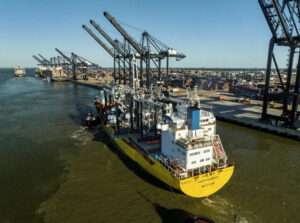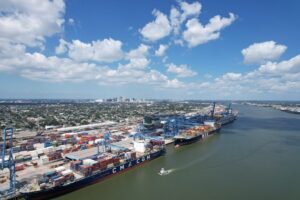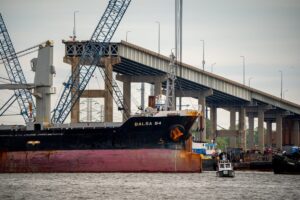Soren Skou, CEO of Maersk Line has made a crucial statement to the shipping industry, detailing how vessel-sharing alliances have been a positive step forward; however, more consolidation within the industry is paramount amid the slump in demand growth, according to the Wall Street Journal.
He said: “We are getting the expected benefits from vessel-sharing agreements, but more can come from consolidation. This year, demand growth is extremely weak, around 1.5% to 2%, much less than anticipated, while capacity will grow around 7%. Coming into the year, we expected demand of 3% to 5%.”
The supply-demand gap has been noted, with overcapacity expected to continue for the next three years, according to a recent report released by Drewry, as well as the fluctuation in freight rates.
Read a Technical Paper by Matthew Gore of Holman Fenwick Willan on freight rates
(Source: Maersk / Facebook)
Analysts estimate that overcapacity is up to 30% above demand on some of the world’s key shipping routes.
Skou continues: “Global [economic] growth is very disappointing, and if we knew what we know today, maybe some of the [investment] decisions we did three years ago we wouldn't have done or they would have been different.
“Maersk Line spends half a billion dollars in [information technology] every year. It is big money. In consolidation, the cost would be shared. It is the same with operating individual headquarters and the cost of containers. If we drive cost down we will be able to live with low freight rates.”
The smaller are expected to be driven out of the industry, as they won’t be able to compete in terms of cost and frequency of port calls.
(Source: Maersk / Facebook)
Speaking of overcapacity and ship sizes, Mr. Skou said there is a limit to how big ships can become.
He concluded: “If you get bigger ships, you will have to sail less frequently to fill them, and that won’t meet our customers’ needs. Unless we start to see massive [economic] growth, it is going to be at least 10 years before bigger ships are seriously considered.”
Maersk Line introduced its Triple-E to boost the potential for saving money through economies of scale, with many other shipping lines following suit by forming their own shipping alliances and ordering the next generation mega-ships.
Its 2M alliance with the world’s second largest shipping line MSC aims to save the two companies a combined US$700 million annually in operating costs through sharing of vessels, networks and port calls.










